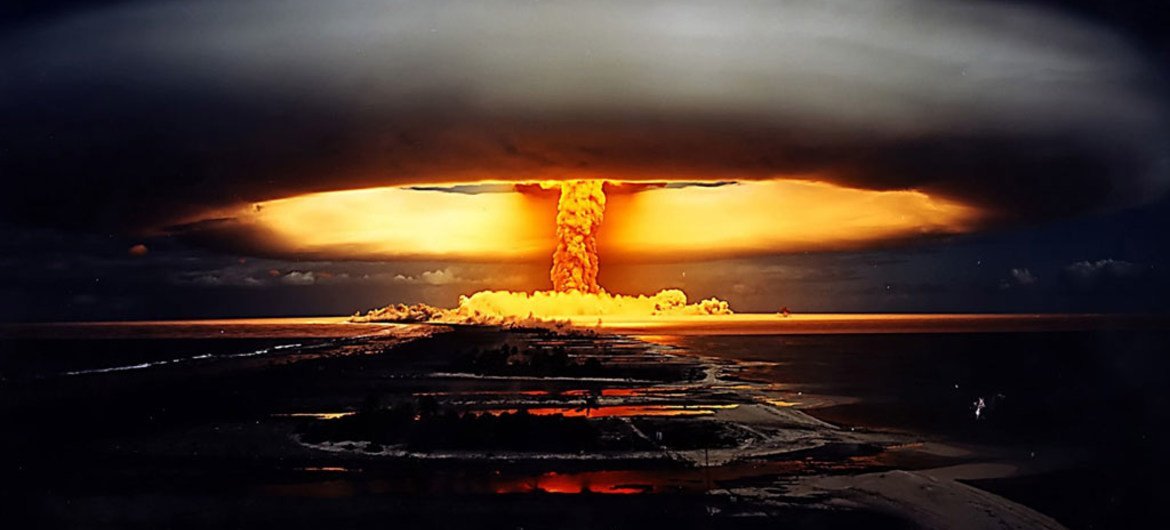Fifty years ago 242 men left New Zealand on a mission to Mururoa Atoll, in French Polynesia.
The crew of HMNZS Otago, and later the frigate Canterbury, were sent there to protest French nuclear testing.
Little did they know that the fallout from the mission would continue decades later, with health problems and worries about the effects on their children and future generations.
Prime Minister Norman Kirk farewelled the Otago on 28 June, 1973.
Twenty-year-old sailor Tony Cox was on board.
“I was standing on the deck along with a lot of other guys, and Norman Kirk was with the skipper, talking to various members of the crew.
“He said to me, ‘Don’t worry about anything, son. Nothing’s going to happen, but if it does, we will look after you’.”
A month later the Otago witnessed an atmospheric test just over 20 miles away.
The crew initially sheltered below deck.
“As soon as the flash had gone they said we could go up and have a look, so [we went] up the ladder and opened the door and out we went,” Cox said.
“It was a bit disappointing. It wasn’t like the movies. It was almost a straight line to start with, then it started to form into a mushroom. It had a pinky, grey colour to it.”
Fellow Otago crewman Ant Kennedy turned 20 at Mururoa.
“I got married at Honolulu. I didn’t know I was going to be married then. We were on the way to southeast Asia to be part of New Zealand’s deployment there.
“Then we were called back and it was jokingly called Norm’s Mystery Tour.”
France started nuclear tests in the Pacific in the 1960s and Kirk’s Labour government was staunchly opposed.
Cabinet minister Fraser Colman travelled there on the Otago, and transferred to the HMNZS Canterbury when it took over protest duties.
Aboard Canterbury, Gavin Smith also witnessed a test.
“We were inside a gas-tight citadel for the explosion. We never thought about the consequences of it until much later, and then people started dying and getting crook.
“We realised that the seawater around there was contaminated. The seawater was used on board for washing vegetables. We washed in it, bathed in it.”
The water was desalinated, but that didn’t remove radiation, as Cox recalls.
“The water around us was contaminated. We didn’t know that,” he said.
“There were no fish there, so that was a waste of time. There were no sea birds anywhere. They were well dead, gone. It was totally different to all the different oceans I’ve been through over the years.”
Kennedy said his health was okay, but he knew he was one of the lucky ones.
He remembers one fellow sailor needing surgery.
“He had this bad cancerous stuff on his face. And a guy called Cloggs. He was a signalman on Canterbury. He was at one of our reunions, and basically he came to that and that was that.
“He was younger than me.
“I thought, holy hell. This seems to be a bit out of the ordinary. You’d expect fit, young sailors to live into their 80s.”
About 20 years ago Cox’s oncologist told him he had a rare form of non-Hodgkin lymphoma.
“[He said], ‘The only time you get this type of cancer is from excessive doses of radiation. Where would you have got that from?’
“I said, ‘I did go to a nuclear bomb test,’ and he said, ‘That’ll do it’.”
Veterans’ costs are covered for sickness arising from service.
But as Smith, the president of the Mururoa Nuclear Veterans group, said, there was concern about subsequent generations.
The group, formed in 2013, is active in trying to get recognition for possible effects on their families.
“Our children and grandchildren have oddball illnesses and we would like to know if that was a result of our service at Mururoa,” Smith said.
“Are we passing on bad genes or are we not?
“All we ask is for DNA testing to be done and when science can prove that fact one way or another we have an answer.
“If science does prove we have passed on bad genes we would simply like our children and grandchildren and the next generations to be looked after if they have an illness that’s related to our service.”
So far, that has not happened, despite regular lobbying of officials and ministers.
For Donna Weir, whose father Allan Hamilton was aboard Canterbury, that concern was real.
Hamilton died in 2021 from aggressive cancer.
“I have had fertility problems, multiple miscarriages and things like that. We have kids who have problems that nobody can explain, if that makes sense.”
That included stomach and vision problems.
Weir said one older sister, who was conceived before 1973, had no such trouble.
The nuclear test veterans deserved greater recognition for their service, she said.
“They’re some of New Zealand’s most forgotten heroes, I think.
“I asked Dad if he knew then what we now know, would you have gone. His answer was quite simply, ‘I signed up to serve my country and that’s what I did.”
French nuclear tests in the Pacific went underground from 1974, but continued until the mid-1990s.
Veterans’ Affairs has been approached for comment.
SOURCE: RNZ PACIFIC/PACNEWS














